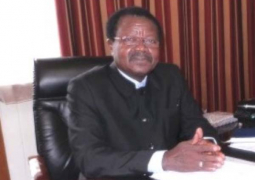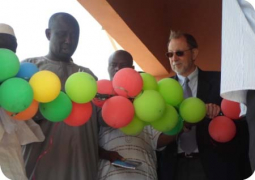The Minister of Forestry and the Environment, Hon. Fatou Ndey Gaye, on Tuesday presided over the opening of GOTG-AfDB workshop on the development of nationally appropriate mitigation action in the Agriculture Sector of The Gambia.
The forum that attracted participants from all sectors was organised by the Department of Water Resources at the Paradise Suites Hotel in Kololi.
In her opening remarks on the occasion, the forestry minister said The Gambia has a narrow economic base relying heavily on its agriculture and related natural resources to provide sustainable livelihood for its citizenry.
She added that climate change impacts on agriculture and natural systems identified in the national communications and National Adaptation Programme of Action (NAPA) of The Gambia put additional burden on achieving sustainable development, longtime prosperity and the Millennium Development Goals in The Gambia.
The linkages between climate change and the many dimensions of equitable development and growth present both a crisis that must be tackled and an opportunity that must be seized.
She said that despite the fact that Gambia has not contributed much to the processes leading to global warming and climate change, “we need to take advantage of the sustainable development opportunities inherent in undertaking greenhouse gas mitigation actions as part of the implementation of the Kyoto Protocol of the climate change convention”.
She thanked the African Development Bank for supporting The Gambia in the development of the country’s nationally appropriate mitigation actions document from October to December 2011 and coming back to support the development of Full Projects under the agriculture sector and related resources and systems.
She said: “I am confident that if properly developed and implemented, the proposed NAMA Projects in the agriculture sector will effectively contribute to meeting the key strategic objectives of the PAGE and the Agriculture and Natural Resources policy.”
For his part, Abdoulie Danso, deputy permanent secretary at the Ministry of Agriculture, said the Gambia government’s vision for the agriculture sector is to transform the country into a major supplier of agricultural products to local and international markets between 2012 and 2015 by increasing food security and boosting the income-generating capacity and the nutritional status of farmers, especially women and the youth.
To adequately respond to these challenges within the framework of climate change scenarios, a set of selected NAMAs were developed through an extensive consultative process that involved representatives from the public and private sectors, civil society organizations and women groups.
He further stated: “Our effort in the development of these priority intervention areas is best complemented with the development of comprehensive agriculture-related NAMAs proposal, which constitutes the purpose of our today gathering in view to exchange ideas in accomplishing this task.”
He went further to recognise the important role played by other UN systems such as the UNDP, the FAO, and UNEP in their invaluable support in addressing the issues and problems related to climate change through financial and technical support.
For her part, Nogoye Thiam, AFDB representative, who commended the Gambia government for its support to the occasion, noted that NAMAs constitute an important entry point through which developing countries could contribute to global mitigation efforts in nationally appropriate ways while taking into account of their objectives of development.



